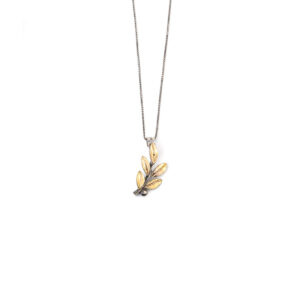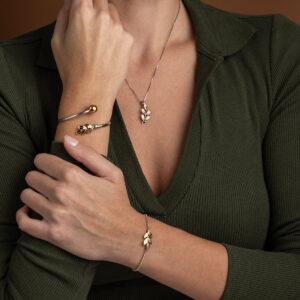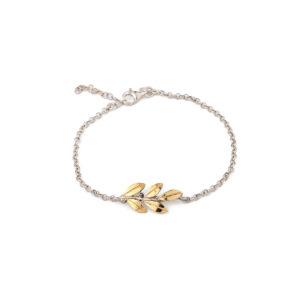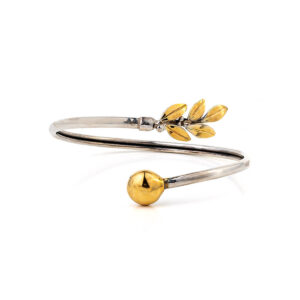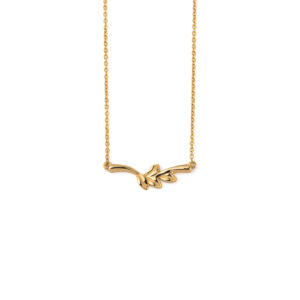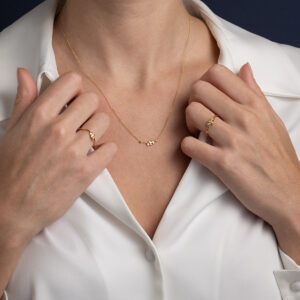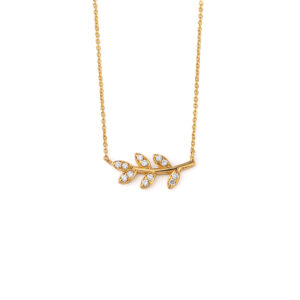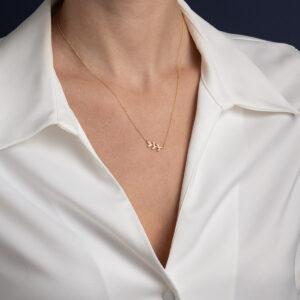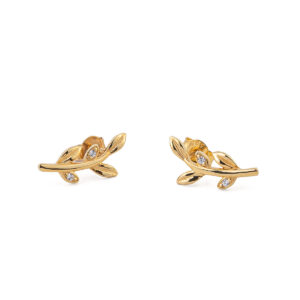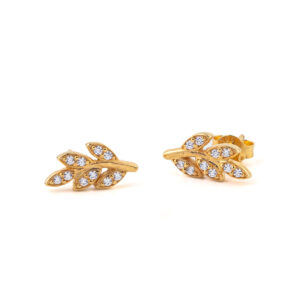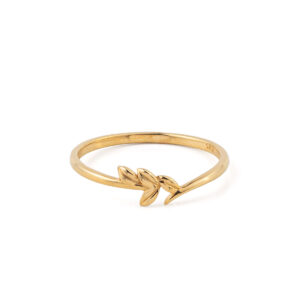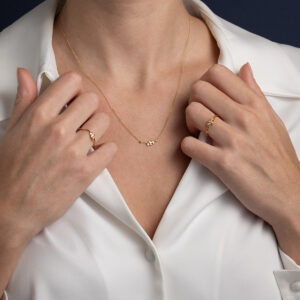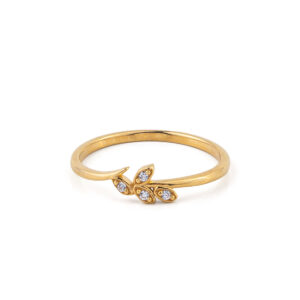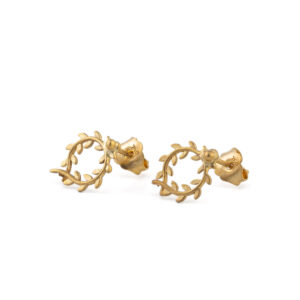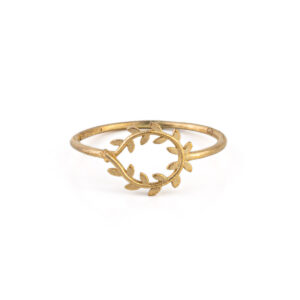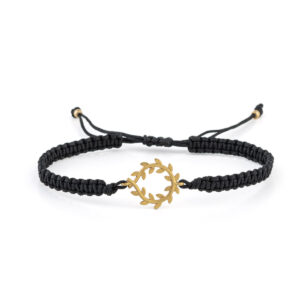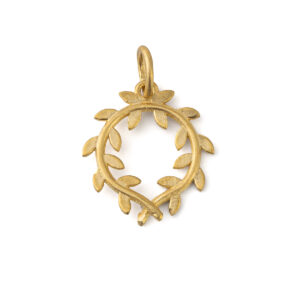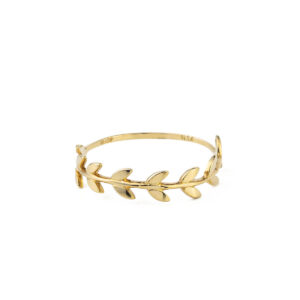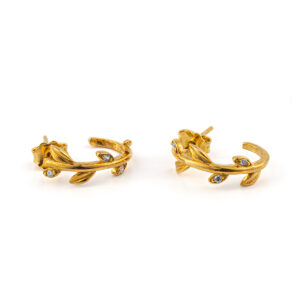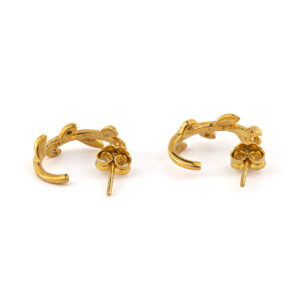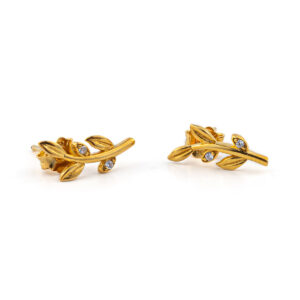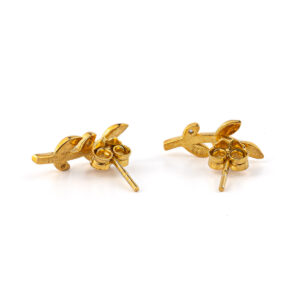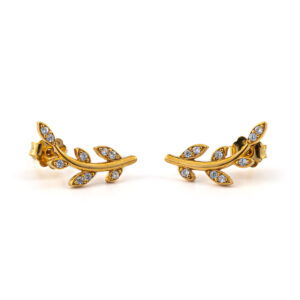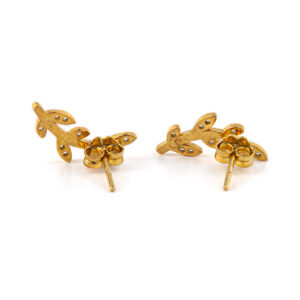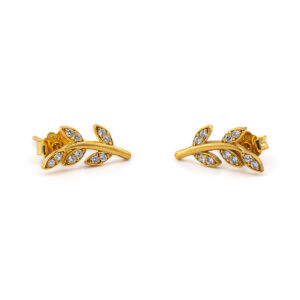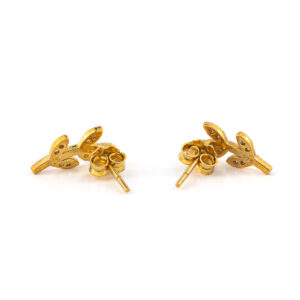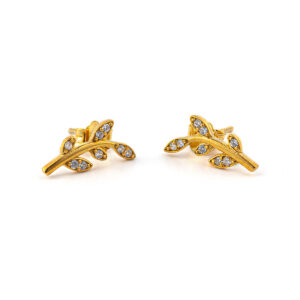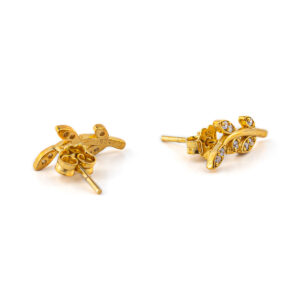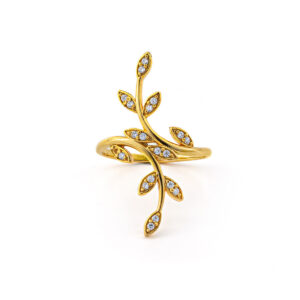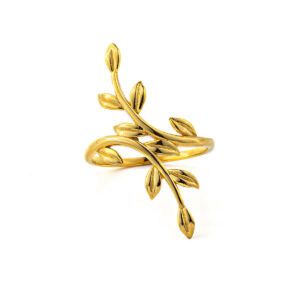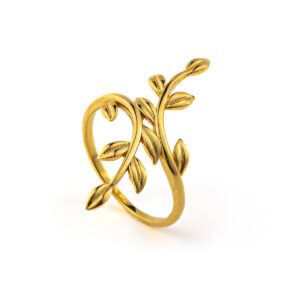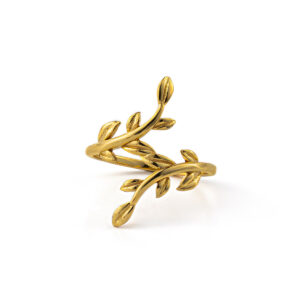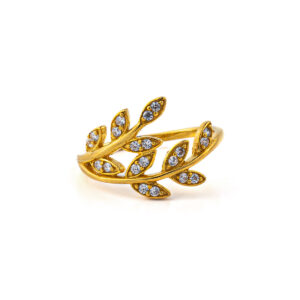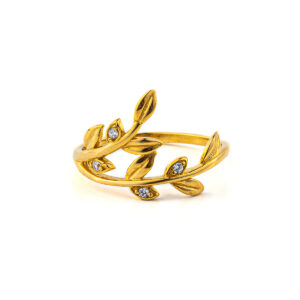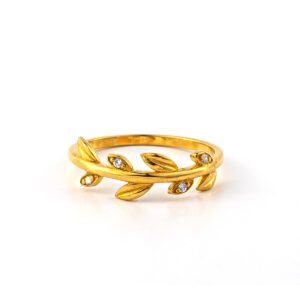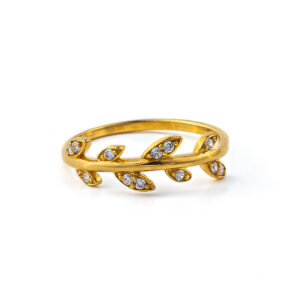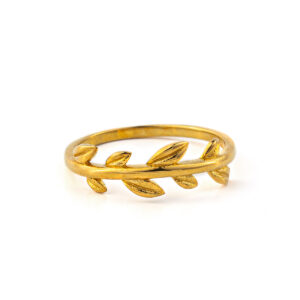Our olive collection, which is inspired by Ancient Greek history and especially from Greek land includes unique handcrafted jewels, earrings, rings, bracelets, brooches with olive leaves and gemstones in sterling silver or gold. The olive tree in Ancient Greece was a symbol of the Olympic ideal, since an olive branch was the only prize for the Olympic champions. The olive tree symbolizes peace, victory, honor, and prosperity.
Olive Leaf Chain Necklace – 14K Gold and Sterling Silver
Made of sterling silver 925° and 14k gold.
Handmade in Greece.
Explore Olive Collection
The olive wreath known as kotinos was the prize for the winner at the ancient Olympic Games. It was an olive branch, of the wild- olive tree that grew at Olympia, intertwined to form a circle or a horse-shoe. According to Pausanias, it was introduced by Heracles as a prize for the running race winner to honor his father Zeus. In the ancient Olympic Games there were no gold, silver, or bronze medals. There was only one winner per event, crowned with an olive wreath made of wild olive leaves from a sacred tree near the temple of Zeus at Olympia. Olive wreaths were given out during the 2004 Summer Olympics in Athens in honor of the ancient tradition because the games were being held in Greece.
Olive Leaf Chain Bracelet – 14K Gold and Sterling Silver
Made of sterling silver 925° and 14k gold.
The bracelet is bendable.
Handmade in Greece.
Explore Olive Collection
The olive wreath known as kotinos was the prize for the winner at the ancient Olympic Games. It was an olive branch, of the wild- olive tree that grew at Olympia, intertwined to form a circle or a horse-shoe. According to Pausanias, it was introduced by Heracles as a prize for the running race winner to honor his father Zeus. In the ancient Olympic Games there were no gold, silver, or bronze medals. There was only one winner per event, crowned with an olive wreath made of wild olive leaves from a sacred tree near the temple of Zeus at Olympia. Olive wreaths were given out during the 2004 Summer Olympics in Athens in honor of the ancient tradition because the games were being held in Greece.
Olive Leaf Bangle Bracelet – 14K Gold and Sterling Silver
Made of sterling silver 925° and 14k gold.
The bracelet is bendable.
Handmade in Greece.
Explore Olive Collection
The olive wreath known as kotinos was the prize for the winner at the ancient Olympic Games. It was an olive branch, of the wild- olive tree that grew at Olympia, intertwined to form a circle or a horse-shoe. According to Pausanias, it was introduced by Heracles as a prize for the running race winner to honor his father Zeus. In the ancient Olympic Games there were no gold, silver, or bronze medals. There was only one winner per event, crowned with an olive wreath made of wild olive leaves from a sacred tree near the temple of Zeus at Olympia. Olive wreaths were given out during the 2004 Summer Olympics in Athens in honor of the ancient tradition because the games were being held in Greece.
Olive Leaf Necklace – 9K Solid Yellow Gold
190,00€Necklace inspired by the olive leaf symbol.
Made of 9k gold.
The olive wreath also known as kotinos was the prize for the winner at the ancient Olympic Games. It was an olive branch, of the wild- olive tree that grew at Olympia, intertwined to form a circle or a horse-shoe. According to Pausanias, it was introduced by Heracles as a prize for the running race winner to honor his father Zeus. In the ancient Olympic Games, there were no gold, silver, or bronze medals. There was only one winner per event, crowned with an olive wreath made of wild olive leaves from a sacred tree near the temple of Zeus at Olympia. Olive wreaths were given out during the 2004 Summer Olympics in Athens in honor of the ancient tradition because the games were being held in Greece.
Handmade item.
Explore Olive Collection
Olive Leaf Necklace with Zircon – 18K Solid Yellow Gold
745,00€Necklace inspired by the olive leaf symbol.
Made of 18k gold with zircon.
The olive wreath also known as kotinos was the prize for the winner at the ancient Olympic Games. It was an olive branch, of the wild- olive tree that grew at Olympia, intertwined to form a circle or a horse-shoe. According to Pausanias it was introduced by Heracles as a prize for the running race winner to honour his father Zeus. In the ancient Olympic Games there were no gold, silver, or bronze medals. There was only one winner per event, crowned with an olive wreath made of wild-olive leaves from a sacred tree near the temple of Zeus at Olympia. Olive wreaths were given out during the 2004 Summer Olympics in Athens in honor of the ancient tradition, because the games were being held in Greece.
Handmade item.
Explore Olive Collection
Olive Leaf Earrings with Zircon – 9K Solid Yellow Gold
250,00€Earrings inspired by the olive leaf symbol.
Made of 9k gold with zircon.
The olive wreath also known as kotinos was the prize for the winner at the ancient Olympic Games. It was an olive branch, of the wild- olive tree that grew at Olympia, intertwined to form a circle or a horse-shoe. According to Pausanias it was introduced by Heracles as a prize for the running race winner to honour his father Zeus. In the ancient Olympic Games there were no gold, silver, or bronze medals. There was only one winner per event, crowned with an olive wreath made of wild-olive leaves from a sacred tree near the temple of Zeus at Olympia. Olive wreaths were given out during the 2004 Summer Olympics in Athens in honor of the ancient tradition, because the games were being held in Greece.
Handmade item.
Explore Olive Collection
Leaf Earrings with Zircon – 14K Yellow Gold
390,00€Earrings inspired by the olive leaf symbol.
Made of 14k gold with zircon.
The olive wreath also known as kotinos was the prize for the winner at the ancient Olympic Games. It was an olive branch, of the wild- olive tree that grew at Olympia, intertwined to form a circle or a horse-shoe. According to Pausanias it was introduced by Heracles as a prize for the running race winner to honour his father Zeus. In the ancient Olympic Games there were no gold, silver, or bronze medals. There was only one winner per event, crowned with an olive wreath made of wild-olive leaves from a sacred tree near the temple of Zeus at Olympia. Olive wreaths were given out during the 2004 Summer Olympics in Athens in honor of the ancient tradition, because the games were being held in Greece.
Handmade item.
Explore Olive Collection
Olive Leaf Ring – 14K Solid Yellow Gold
192,00€Ring inspired by the olive leaf symbol.
Made of 14k gold.
The olive wreath also known as kotinos was the prize for the winner at the ancient Olympic Games. It was an olive branch, of the wild- olive tree that grew at Olympia, intertwined to form a circle or a horse-shoe. According to Pausanias it was introduced by Heracles as a prize for the running race winner to honour his father Zeus. In the ancient Olympic Games there were no gold, silver, or bronze medals. There was only one winner per event, crowned with an olive wreath made of wild-olive leaves from a sacred tree near the temple of Zeus at Olympia. Olive wreaths were given out during the 2004 Summer Olympics in Athens in honor of the ancient tradition, because the games were being held in Greece.
Handmade item.
Explore Olive Collection
Olive Ring with Zircon – 14K Solid Yellow Gold
249,00€Ring inspired by the olive leaf symbol.
Made of 14k gold with zircon.
The olive wreath also known as kotinos was the prize for the winner at the ancient Olympic Games. It was an olive branch, of the wild- olive tree that grew at Olympia, intertwined to form a circle or a horse-shoe. According to Pausanias it was introduced by Heracles as a prize for the running race winner to honour his father Zeus. In the ancient Olympic Games there were no gold, silver, or bronze medals. There was only one winner per event, crowned with an olive wreath made of wild-olive leaves from a sacred tree near the temple of Zeus at Olympia. Olive wreaths were given out during the 2004 Summer Olympics in Athens in honor of the ancient tradition, because the games were being held in Greece.
Handmade item.
Explore Olive Collection
Olive Wreath Earrings – 14K Solid Yellow Gold
275,00€Earrings inspired by the olive leaf symbol.
Made of 14k gold.
The olive wreath also known as kotinos was the prize for the winner at the ancient Olympic Games. It was an olive branch, of the wild- olive tree that grew at Olympia,intertwined to form a circle or a horse-shoe. According to Pausanias it was introduced by Heracles as a prize for the running race winner to honour his father Zeus. In the ancient Olympic Games there were no gold, silver, or bronze medals. There was only one winner per event, crowned with an olive wreath made of wild-olive leaves from a sacred tree near the temple of Zeus at Olympia. Olive wreaths were given out during the 2004 Summer Olympics in Athens in honor of the ancient tradition, because the games were being held in Greece.
Olive Wreath Ring – 14K Gold
205,00€The olive tree in Ancient Greece was a symbol of the Olympic ideal, since an olive branch was the only prize for the Olympic champions. Τhe olive tree symbolizes peace, victory, honor and prosperity.
Made of 14k gold.
Handmade item.
Olive Wreath Macrame Bracelet – 14K Gold
170,00€This is a gold bracelet with 14k gold olive wreath.
Handmade item.
The olive wreath also known as kotinos was the prize for the winner at the ancient Olympic Games. It was an olive branch, of the wild- olive tree that grew at Olympia,intertwined to form a circle or a horse-shoe. According to Pausanias it was introduced by Heracles as a prize for the running race winner to honour his father Zeus. In the ancient Olympic Games there were no gold, silver, or bronze medals. There was only one winner per event, crowned with an olive wreath made of wild-olive leaves from a sacred tree near the temple of Zeus at Olympia. Olive wreaths were given out during the 2004 Summer Olympics in Athens in honor of the ancient tradition, because the games were being held in Greece.
Olive Wreath Pendant – 14K Gold
145,00€A pendant inspired by the olive branch, a symbol of peace, abundance and achievement.
Made of 14K gold.
Handmade item.
The chain shown is our Cable Chain in 14K Gold (not included).
The olive wreath also known as kotinos was the prize for the winner at the ancient Olympic Games. It was an olive branch, of the wild- olive tree that grew at Olympia, intertwined to form a circle or a horse-shoe. According to Pausanias it was introduced by Heracles as a prize for the running race winner to honor his father Zeus. In the ancient Olympic Games there were no gold, silver, or bronze medals. There was only one winner per event, crowned with an olive wreath made of wild-olive leaves from a sacred tree near the temple of Zeus at Olympia. Olive wreaths were given out during the 2004 Summer Olympics in Athens in honor of the ancient tradition, because the games were being held in Greece.
Leaf Ring – 14K Yellow Gold
185,00€Made of 14k gold.
The olive wreath also known as kotinos was the prize for the winner at the ancient Olympic Games. It was an olive branch, of the wild- olive tree that grew at Olympia, intertwined to form a circle or a horse-shoe. According to Pausanias it was introduced by Heracles as a prize for the running race winner to honour his father Zeus. In the ancient Olympic Games there were no gold, silver, or bronze medals. There was only one winner per event, crowned with an olive wreath made of wild-olive leaves from a sacred tree near the temple of Zeus at Olympia. Olive wreaths were given out during the 2004 Summer Olympics in Athens in honor of the ancient tradition because the games were being held in Greece.
Leaf Ring – 9K Yellow Gold
95,00€Ring inspired by the olive leaf symbol.
Made of 9k gold.
The olive wreath also known as kotinos was the prize for the winner at the ancient Olympic Games. It was an olive branch, of the wild- olive tree that grew at Olympia, intertwined to form a circle or a horse-shoe. According to Pausanias it was introduced by Heracles as a prize for the running race winner to honour his father Zeus. In the ancient Olympic Games there were no gold, silver, or bronze medals. There was only one winner per event, crowned with an olive wreath made of wild-olive leaves from a sacred tree near the temple of Zeus at Olympia. Olive wreaths were given out during the 2004 Summer Olympics in Athens in honor of the ancient tradition, because the games were being held in Greece.
Olive Leaves Earrings with Zircon – 14K Solid Yellow Gold
492,00€Earrings inspired by the olive leaf symbol.
Made of 14k gold with zircon.
The olive wreath also known as kotinos was the prize for the winner at the ancient Olympic Games. It was an olive branch, of the wild- olive tree that grew at Olympia, intertwined to form a circle or a horse-shoe. According to Pausanias it was introduced by Heracles as a prize for the running race winner to honour his father Zeus. In the ancient Olympic Games there were no gold, silver, or bronze medals. There was only one winner per event, crowned with an olive wreath made of wild-olive leaves from a sacred tree near the temple of Zeus at Olympia. Olive wreaths were given out during the 2004 Summer Olympics in Athens in honor of the ancient tradition, because the games were being held in Greece.
Olive Leaf Earrings with Zircon – 14K Solid Yellow Gold
340,00€Earrings inspired by the olive leaf symbol.
Made of 14k gold with zircon.
The olive wreath also known as kotinos was the prize for the winner at the ancient Olympic Games. It was an olive branch, of the wild- olive tree that grew at Olympia,intertwined to form a circle or a horse-shoe. According to Pausanias it was introduced by Heracles as a prize for the running race winner to honour his father Zeus. In the ancient Olympic Games there were no gold, silver, or bronze medals. There was only one winner per event, crowned with an olive wreath made of wild-olive leaves from a sacred tree near the temple of Zeus at Olympia. Olive wreaths were given out during the 2004 Summer Olympics in Athens in honor of the ancient tradition, because the games were being held in Greece.
Olive Leaf Zircon Earrings – 14K Solid Yellow Gold
408,00€Earrings inspired by the olive leaf symbol.
Made of 14k gold with zircon.
The olive wreath also known as kotinos was the prize for the winner at the ancient Olympic Games. It was an olive branch, of the wild- olive tree that grew at Olympia,intertwined to form a circle or a horse-shoe. According to Pausanias it was introduced by Heracles as a prize for the running race winner to honour his father Zeus. In the ancient Olympic Games there were no gold, silver, or bronze medals. There was only one winner per event, crowned with an olive wreath made of wild-olive leaves from a sacred tree near the temple of Zeus at Olympia. Olive wreaths were given out during the 2004 Summer Olympics in Athens in honor of the ancient tradition, because the games were being held in Greece.
Leaf Zircon Earrings – 14K Solid Yellow Gold
459,00€Earrings inspired by the olive leaf symbol.
Made of 14k gold with zircon.
The olive wreath also known as kotinos was the prize for the winner at the ancient Olympic Games. It was an olive branch, of the wild- olive tree that grew at Olympia,intertwined to form a circle or a horse-shoe. According to Pausanias it was introduced by Heracles as a prize for the running race winner to honour his father Zeus. In the ancient Olympic Games there were no gold, silver, or bronze medals. There was only one winner per event, crowned with an olive wreath made of wild-olive leaves from a sacred tree near the temple of Zeus at Olympia. Olive wreaths were given out during the 2004 Summer Olympics in Athens in honor of the ancient tradition, because the games were being held in Greece.
Leaf Earrings with Zircon – 14K Solid Yellow Gold
340,00€Earrings inspired by the olive leaf symbol.
Made of 14k gold with zircon.
The olive wreath also known as kotinos was the prize for the winner at the ancient Olympic Games. It was an olive branch, of the wild- olive tree that grew at Olympia,intertwined to form a circle or a horse-shoe. According to Pausanias it was introduced by Heracles as a prize for the running race winner to honour his father Zeus. In the ancient Olympic Games there were no gold, silver, or bronze medals. There was only one winner per event, crowned with an olive wreath made of wild-olive leaves from a sacred tree near the temple of Zeus at Olympia. Olive wreaths were given out during the 2004 Summer Olympics in Athens in honor of the ancient tradition, because the games were being held in Greece.
Olive Leaf Ring with Zircon – 14K Solid Yellow Gold
476,00€Ring inspired by the olive leaf symbol.
Made of 14k gold with zircon.
The olive wreath also known as kotinos was the prize for the winner at the ancient Olympic Games. It was an olive branch, of the wild- olive tree that grew at Olympia, intertwined to form a circle or a horse-shoe. According to Pausanias it was introduced by Heracles as a prize for the running race winner to honour his father Zeus. In the ancient Olympic Games there were no gold, silver, or bronze medals. There was only one winner per event, crowned with an olive wreath made of wild-olive leaves from a sacred tree near the temple of Zeus at Olympia. Olive wreaths were given out during the 2004 Summer Olympics in Athens in honor of the ancient tradition because the games were being held in Greece.
Leaf Adjustable Ring with Zircon – 14K Solid Yellow Gold
408,00€Ring inspired by the olive leaf symbol.
Made of 14k gold with zircon.
The olive wreath also known as kotinos was the prize for the winner at the ancient Olympic Games. It was an olive branch, of the wild- olive tree that grew at Olympia, intertwined to form a circle or a horse-shoe. According to Pausanias it was introduced by Heracles as a prize for the running race winner to honour his father Zeus. In the ancient Olympic Games there were no gold, silver, or bronze medals. There was only one winner per event, crowned with an olive wreath made of wild-olive leaves from a sacred tree near the temple of Zeus at Olympia. Olive wreaths were given out during the 2004 Summer Olympics in Athens in honor of the ancient tradition, because the games were being held in Greece.
Olive Leaf Branch Ring – 18K Solid Yellow Gold
630,00€Ring inspired by the olive leaf symbol.
Made of 18k gold.
The olive wreath also known as kotinos was the prize for the winner at the ancient Olympic Games. It was an olive branch, of the wild- olive tree that grew at Olympia, intertwined to form a circle or a horse-shoe. According to Pausanias it was introduced by Heracles as a prize for the running race winner to honour his father Zeus. In the ancient Olympic Games there were no gold, silver, or bronze medals. There was only one winner per event, crowned with an olive wreath made of wild-olive leaves from a sacred tree near the temple of Zeus at Olympia. Olive wreaths were given out during the 2004 Summer Olympics in Athens in honor of the ancient tradition, because the games were being held in Greece.
Olive Leaf Branch Ring – 14K Solid Yellow Gold
440,00€Ring inspired by the olive leaf symbol.
Made of 14k gold.
The olive wreath also known as kotinos was the prize for the winner at the ancient Olympic Games. It was an olive branch, of the wild- olive tree that grew at Olympia, intertwined to form a circle or a horse-shoe. According to Pausanias it was introduced by Heracles as a prize for the running race winner to honour his father Zeus. In the ancient Olympic Games there were no gold, silver, or bronze medals. There was only one winner per event, crowned with an olive wreath made of wild-olive leaves from a sacred tree near the temple of Zeus at Olympia. Olive wreaths were given out during the 2004 Summer Olympics in Athens in honor of the ancient tradition because the games were being held in Greece.
Olive Leaf Ring with White Zircon – 14K Solid Yellow Gold
476,00€Ring inspired by the olive leaf symbol.
Made of 14k gold with zircon.
The olive wreath also known as kotinos was the prize for the winner at the ancient Olympic Games. It was an olive branch, of the wild- olive tree that grew at Olympia, intertwined to form a circle or a horse-shoe. According to Pausanias it was introduced by Heracles as a prize for the running race winner to honour his father Zeus. In the ancient Olympic Games there were no gold, silver, or bronze medals. There was only one winner per event, crowned with an olive wreath made of wild-olive leaves from a sacred tree near the temple of Zeus at Olympia. Olive wreaths were given out during the 2004 Summer Olympics in Athens in honor of the ancient tradition because the games were being held in Greece.
Olive Branch Ring – 18K Solid Yellow Gold
567,00€Ring inspired by the olive leaf symbol.
Made of 18k gold.
The olive wreath also known as kotinos was the prize for the winner at the ancient Olympic Games. It was an olive branch, of the wild- olive tree that grew at Olympia, intertwined to form a circle or a horse-shoe. According to Pausanias it was introduced by Heracles as a prize for the running race winner to honour his father Zeus. In the ancient Olympic Games there were no gold, silver, or bronze medals. There was only one winner per event, crowned with an olive wreath made of wild-olive leaves from a sacred tree near the temple of Zeus at Olympia. Olive wreaths were given out during the 2004 Summer Olympics in Athens in honor of the ancient tradition because the games were being held in Greece.
Olive Branch Ring – 14K Solid Yellow Gold
408,00€Ring inspired by the olive leaf symbol.
Made of 14k gold.
The olive wreath also known as kotinos was the prize for the winner at the ancient Olympic Games. It was an olive branch, of the wild- olive tree that grew at Olympia, intertwined to form a circle or a horse-shoe. According to Pausanias it was introduced by Heracles as a prize for the running race winner to honour his father Zeus. In the ancient Olympic Games there were no gold, silver, or bronze medals. There was only one winner per event, crowned with an olive wreath made of wild-olive leaves from a sacred tree near the temple of Zeus at Olympia. Olive wreaths were given out during the 2004 Summer Olympics in Athens in honor of the ancient tradition because the games were being held in Greece.
Olive Leaf Ring with Zircon – 14K Solid Yellow Gold
459,00€Ring inspired by the olive leaf symbol.
Made of 14k gold with zircon.
The olive wreath also known as kotinos was the prize for the winner at the ancient Olympic Games. It was an olive branch, of the wild- olive tree that grew at Olympia, intertwined to form a circle or a horse-shoe. According to Pausanias it was introduced by Heracles as a prize for the running race winner to honour his father Zeus. In the ancient Olympic Games there were no gold, silver, or bronze medals. There was only one winner per event, crowned with an olive wreath made of wild-olive leaves from a sacred tree near the temple of Zeus at Olympia. Olive wreaths were given out during the 2004 Summer Olympics in Athens in honor of the ancient tradition because the games were being held in Greece.
Leaf Zircon Ring – 14K Solid Yellow Gold
390,00€Ring inspired by the olive leaf symbol.
Made of 14k gold with zircon.
The olive wreath also known as kotinos was the prize for the winner at the ancient Olympic Games. It was an olive branch, of the wild- olive tree that grew at Olympia, intertwined to form a circle or a horse-shoe. According to Pausanias it was introduced by Heracles as a prize for the running race winner to honour his father Zeus. In the ancient Olympic Games there were no gold, silver, or bronze medals. There was only one winner per event, crowned with an olive wreath made of wild-olive leaves from a sacred tree near the temple of Zeus at Olympia. Olive wreaths were given out during the 2004 Summer Olympics in Athens in honor of the ancient tradition because the games were being held in Greece.
Leaf Zircon Ring – 14K Solid Yellow Gold
323,00€Ring inspired by the olive leaf symbol.
Made of 14k gold with zircon.
The olive wreath also known as kotinos was the prize for the winner at the ancient Olympic Games. It was an olive branch, of the wild- olive tree that grew at Olympia, intertwined to form a circle or a horse-shoe. According to Pausanias it was introduced by Heracles as a prize for the running race winner to honour his father Zeus. In the ancient Olympic Games there were no gold, silver, or bronze medals. There was only one winner per event, crowned with an olive wreath made of wild-olive leaves from a sacred tree near the temple of Zeus at Olympia. Olive wreaths were given out during the 2004 Summer Olympics in Athens in honor of the ancient tradition because the games were being held in Greece.
Leaf Ring with Zircon – 14K Solid Yellow Gold
323,00€Ring inspired by the olive leaf symbol.
Made of 14k gold with zircon.
The olive wreath also known as kotinos was the prize for the winner at the ancient Olympic Games. It was an olive branch, of the wild- olive tree that grew at Olympia, intertwined to form a circle or a horse-shoe. According to Pausanias it was introduced by Heracles as a prize for the running race winner to honour his father Zeus. In the ancient Olympic Games there were no gold, silver, or bronze medals. There was only one winner per event, crowned with an olive wreath made of wild-olive leaves from a sacred tree near the temple of Zeus at Olympia. Olive wreaths were given out during the 2004 Summer Olympics in Athens in honor of the ancient tradition because the games were being held in Greece.
Leaf Ring – 18K Solid Yellow Gold
460,00€Ring inspired by the olive leaf symbol.
Made of 18k gold.
The olive wreath also known as kotinos was the prize for the winner at the ancient Olympic Games. It was an olive branch, of the wild- olive tree that grew at Olympia, intertwined to form a circle or a horse-shoe. According to Pausanias it was introduced by Heracles as a prize for the running race winner to honour his father Zeus. In the ancient Olympic Games there were no gold, silver, or bronze medals. There was only one winner per event, crowned with an olive wreath made of wild-olive leaves from a sacred tree near the temple of Zeus at Olympia. Olive wreaths were given out during the 2004 Summer Olympics in Athens in honor of the ancient tradition because the games were being held in Greece.

